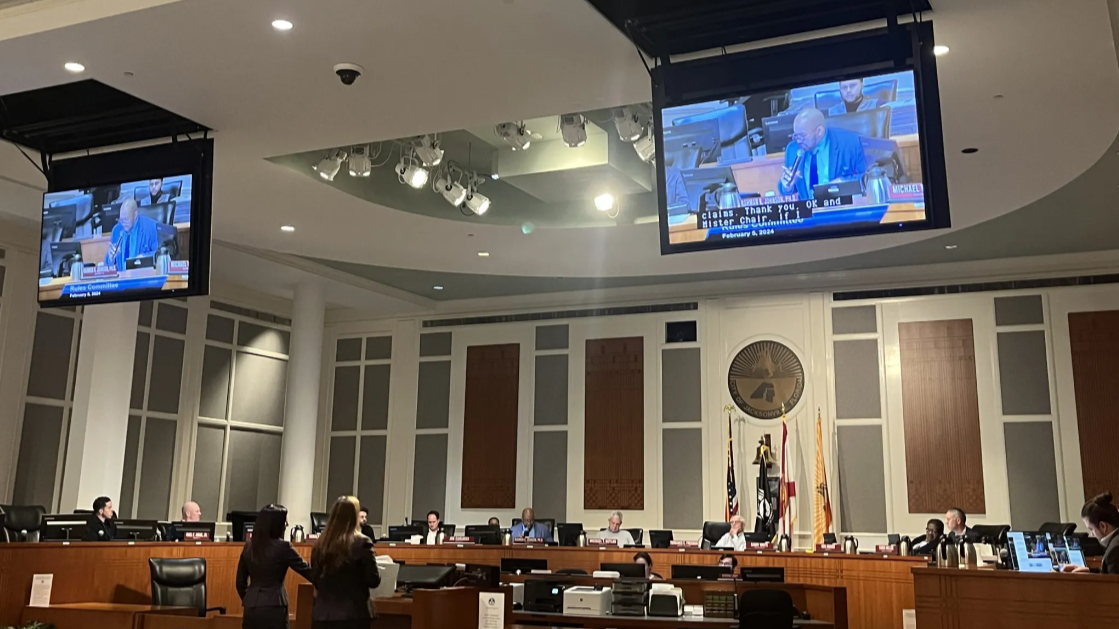After an hour-long meeting Monday, the Jacksonville City Council Rules Committee amended a piece of legislation that would have given the sheriff the power to override decisions made regarding the resolution of lawsuits that involve his officers.
Sheriff T.K. Waters had requested legislation that would require that the city first seek approval from a constitutional officer — that is, the sheriff, the tax collector, property appraiser, supervisor of elections and the clerk of courts — before settling any lawsuits involving their offices.
City Council Vice President Randy White proposed an amendment Monday that softened the language, allowing City Council to step in if the constitutional officer and the city’s risk-management professionals disagree about whether the city ought to settle a lawsuit. The Rules Committee accepted that change.
Waters requested the new authority after he wasn’t told in advance about a $200,000 settlement related to the 2019 police killing of Florida A&M University student Jamee Johnson.
Despite the payment, the city did not admit the officer did anything wrong, and the State Attorney’s Office had declined to prosecute the officer, clearing him of any crime prior to the settlement. Instead, the city said it settled because of the “uncertainty” of a trial, and as a cost-savings measure — a move that “deeply disappointed” Waters.
After The Tributary reported on the agreement in November when the case was closed and three months after the settlement was drafted, Waters told reporters the settlement was made without his knowledge or consent. His undersheriff was emailed about the settlement Aug. 1, after a decision had already been made. On Aug. 12, the sheriff met with a member of the Office of General Counsel, but details of what happened during that meeting have not been made public.
Seven members of the City Council co-sponsored and introduced the legislation on Jan. 10: Nick Howland, Chris Miller, Raul Arias, Joe Carlucci, Ken Amaro, Will Lahnen and Terrance Freeman.
Monday’s lengthy debate among the Rules Committee members — all but one of whom are Republicans like Waters — included a fiery plea from Lara Mattina, a former prosecutor who is now the organizational strategic executive for the Jacksonville Sheriff’s Office. She argued the office had suffered severe reputational damage due to the settlement.
“There is no time in history that policing has been more difficult, and public trust in policing has been more fraught,” she said. “What this settlement in the Jamee Johnson case did was move us back significantly.”
Ken Amaro, one of the original co-sponsors of the bill, pushed back against that, saying he believed the community’s trust in the Sheriff’s Office would have been affected regardless of whether the city settled the lawsuit.
Amaro said he had concerns about how much power the legislation would give to individual constitutional officers instead of trusting the city’s risk management professionals.
Supervisor of Elections Jerry Holland, another constitutional officer who would gain more power out of the proposed bill, said he too felt it was improper to give individual elected officials the power to control how much the city spends on litigation. The power of the budget should rest with the city instead, he argued.
The Finance Committee was to discuss the amended legislation at 9:30 a.m. Tuesday.
Anna Brosche, the city’s finance director, acknowledged during Monday’s meeting that there was a lapse in communication between the Office of General Counsel and Waters before the city decided to settle with Johnson’s family.
“It was believed that there was communication happening, and we missed that, and we have to get the communication right,” Brosche said. “While prior sheriffs have not always been as involved as Sheriff Waters, we absolutely respect his desire to have a voice in the process.”
Brosche offered solutions to make sure a communication lapse doesn’t happen again, including that constitutional officers get notified when the city receives a letter stating an intention to sue. She also said a designee from each office can attend monthly meetings that OGC and the Risk Management Division have.
Brosche warned members that passing the legislation could mean a potential raise in the cost of city insurance or being dropped by the city’s current provider altogether. No other municipality allows for this type of authorization, she said.
And, if the city were to take a case to trial despite Risk Management’s recommendation to settle, the city would bear the financial burden of that decision, not the constitutional officer. Rejecting a settlement would also put the officer or other city employee at risk of being held liable at trial.
Despite that, Mattina said the legislation was necessary to make sure sheriff’s officers and other constitutional offices in the city can protect themselves and their reputations.
Mattina also pushed back on the word “veto” to describe the power granted to constitutional officers over any settlement in the original legislation, even though that legislation would have allowed Waters and other constitutional officers to block any settlement.
Councilman Rahman Johnson, the lone Democrat on the committee, said he was worried the legislation was being pushed through before it had been appropriately considered.
“This legislation, for me, does not seem like it’s completely vetted,” he said. “It gives too much power to a constitutional officer. Based on what I see, one person can make a decision that takes us to court and costs the city millions of dollars.”
Waters also spoke to the council, telling them his request for the legislation was “not a power grab.”
He said that in a situation like the Jamee Johnson one, he would have had discussions with Risk Management and the city’s attorneys.
“We don’t have a policeman sitting on the City Council,” he said. “And to understand what happens when something like this happens, how it affects the morale of the agency, the city … the impact it has on the agency, as a public-facing agency, is detrimental.”
This story is published through a partnership between Jacksonville Today and The Tributary.
Lead image: Lara Mattina, organizational strategic executive for the Jacksonville Sheriff’s Office, and Gaby Young from the General Counsel’s Office speak to City Council’s Rules Committee on Monday, Feb. 5, 2024. | Nichole Manna, The Tributary
Nichole Manna is The Tributary’s criminal justice reporter. You can reach her at nichole.manna@jaxtrib.org or on Twitter at @NicholeManna.







